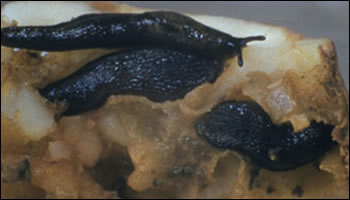SLUGS AND SNAILS
Slugs are persistent and widespread pests which can cause havoc in the garden, eating holes in leaves, stems, flowers, tubers and bulbs.
They can cause damage throughout the year on a wide range of plants, but seedlings and new growth in spring are most at risk. Slugs are gastropods; single-shelled, soft-bodied animals in the mollusc group of animals. Slugs can use their rasping tongues to make holes in leaves, stems, buds, flowers, roots, corms, bulbs and tubers of many plants.

Most slugs feed at night, and the slime trails, if present, can alert you to the level of activity. Damage is usually most severe during warm humid periods.
Slugs are so abundant in gardens that some damage has to be tolerated. They cannot be eradicated so targeting control measures to protect particularly vulnerable plants, such as seedlings and soft young shoots on herbaceous plants will give the best results.
There are many preventive measures that have been used by gardeners to minimise slug damage.
Most of these do not have any scientific evidence to prove that they are effective.
- Transplanting sturdy plantlets grown on in pots, rather than young vulnerable seedlings. Transplants can be given some protection with cloches
- Torchlight searches on mild evenings, especially when the weather is damp; hand-picking slugs into a container. They can then be taken to a field, hedgerow or patch of waste ground well away from gardens, or killed in the freezer before being added to the compost heap or put in the bin
- Some birds, frogs, toads, hedgehogs, slow-worms and ground beetles eat slugs and these predators should be encouraged in gardens
- Raking over soil and removing fallen leaves during winter can allow birds to eat slug eggs that have been exposed
- Traps, such as scooped out half orange, grapefruit or melon skins, can be laid cut side down, or jars part-filled with beer and sunk into the soil near vulnerable plants. Check and empty these regularly, preferably every morning. Proprietary traps are also available from garden centres and mail order suppliers
- Barriers, thought to repel slugs, include rough or sharp textured mulches and substances thought to be distasteful or strong smelling. Copper-base barriers have been shown to repel slugs in some studies. A recent RHS study in a garden-realistic scenario however, found no reduction in slug damage from barriers made of copper tape, bark mulch, eggshells, sharp grit or wool pellets